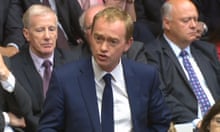At a time when most politicians are dithering, Ruth Davidson is doing a good job of stamping her mark on events. The leader of the Scottish Tories met the prime minister in Downing Street on Monday afternoon to share her view that Brexit should soften. On Friday, as it became clear Theresa May could only govern with support from the DUP, she demanded reassurances the Northern Irish party’s anti-gay policies would be challenged.
Taking the Scottish Tories from one seat to 13 deserves plaudits. Defeating the SNP’s former leader Alex Salmond in the process earned her adulation from a party that has the word “unionist” in its title. Ruth Davidson is one the few credible politicians left standing.
That English Tories may look to her with hope is easy to understand. Compared to Theresa May’s awkwardness, she is authentically charming and funny. Against Boris Johnson, she is hardworking and normal. The problem for the Tories – much to Johnson’s relief – is that she does not appear in a rush to rescue the UK-wide party. She has repeatedly said she is happy to stay an MSP, happy to fight the next Holyrood election and has no desire to transfer to the Westminster stage.
Yet she is in no doubt she wants to be heard, not just on the dangers of doing deals with the DUP, but on the direction of the UK’s continuity government. The reasons for this are two-fold. She is a politician of the devolution era. She doesn’t recognise a power hierarchy of London first, Edinburgh second. In her view, it’s perfectly legitimate for a Holyrood politician to influence Downing Street policy.
The second reason is that to continue her assault on SNP power, she needs to show that Scotland is heard in London, and that Scots can have a strong voice across the UK. Nationalists say Scottish unionist politicians are ignored south of the border. Davidson’s plans of forming the next Holyrood government rely on this being shown to be false.
London Tories would be foolish to pay lip-service to Davidson. Their own chances of staying in power and even forming the next government rely on the continued success of the Scottish Tories.
Davidson has a record of saying what she thinks. She objected when George Osborne wanted to cut tax credits for working families and lobbied him for North Sea tax relief – on both she was successful. She spoke out when rumours suggested the UK was to cut international aid budgets. Perhaps most tellingly, long before anyone imagined the Tories would rely on the DUP, she went to Northern Ireland last year to argue for equal marriage in the province. She is pro-EU. In an interview on the BBC’s Today programme days before the election she said she would go along with Brexit – opponents pointed to this as her changing her mind, but it was more likely a piece of political necessity.
Davidson believes that Europe should stay together and that single market membership is the best option for the Scottish economy. Given that the SNP has been demanding Scotland stay in the single market post-Brexit, it will do her no harm if she can be seen to have softened the UK government line. As to what else she believes, that’s hard to gauge. Her electoral rise has been mainly a result of opposing Scottish independence.
The Scottish Conservatives used to want more cops on the beat, greater money for enterprise, help for small business and to privatise Scottish Water. In the days of the SNP minority government, Alex Salmond enacted the first three as part of deals to get budgets passed, and the last has dropped off the agenda.
Davidson isn’t an ideologue in favour of a much smaller state and open markets. Under her leadership, there has been no call for Scottish Enterprise to be scrapped, as the English equivalents were, for example. She is evidently not a social conservative and nor is she a fanatical unionist of the type who refers to Scotland as North Britain. She once had a “line in the sand” about no more powers for Holyrood but dropped this when the third Scotland Act came about. Indeed, she fits most neatly into the old Scottish Conservative and Unionist party’s tradition of pragmatic moderation; unburdened by policy detail, at ease in her skin, not shy of an opportunity but not aggressively ambitious.
I should declare an interest. She walks her dog in the same city-centre park as mine. While this doesn’t affect my political judgment, it does humanise a politician when they are seen, the morning after the council elections, in a grey hoodie holding a poo bag. For decades the Tories in Scotland have also been held at arm’s length, emitting an unpleasant smell. Davidson has charm and political instinct on a par with Alex Salmond – and it could take her very far.









